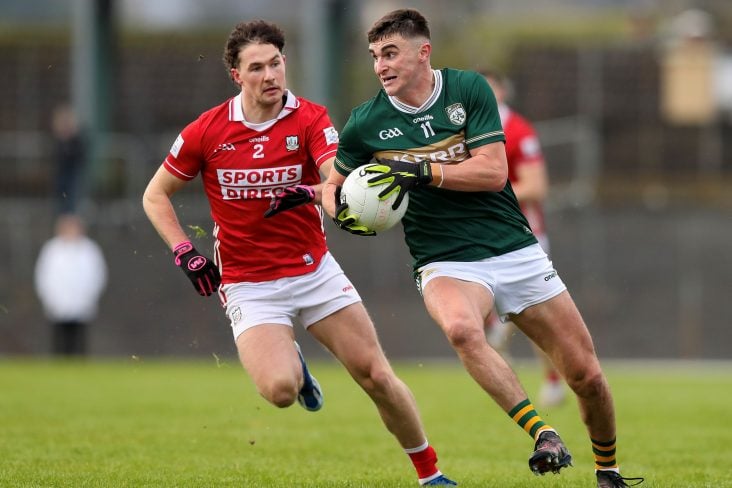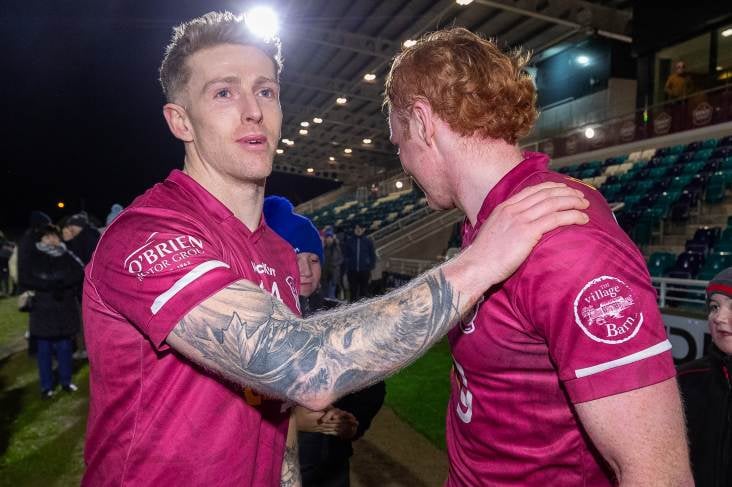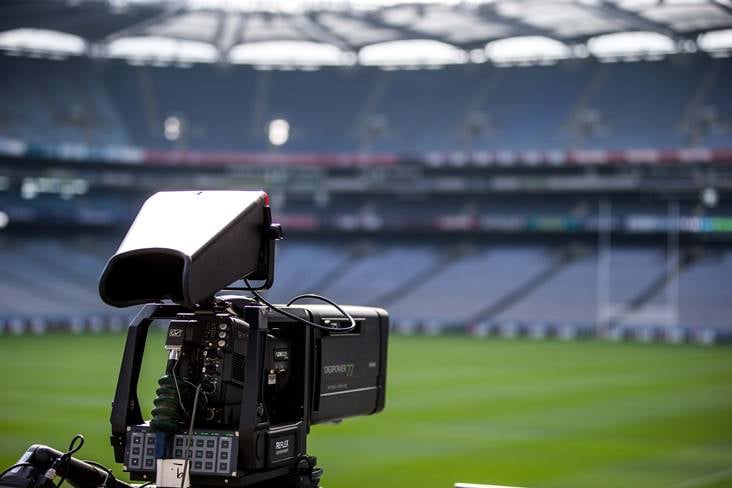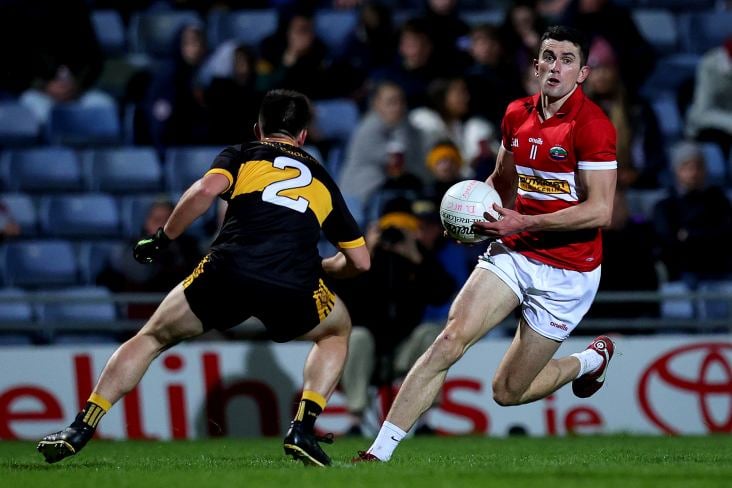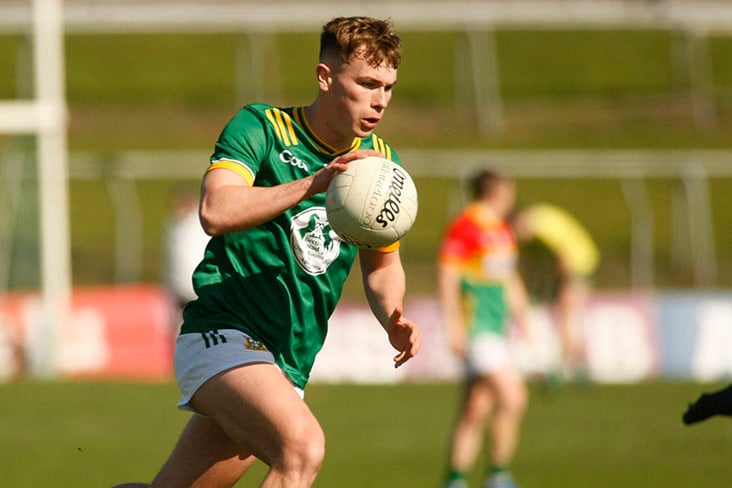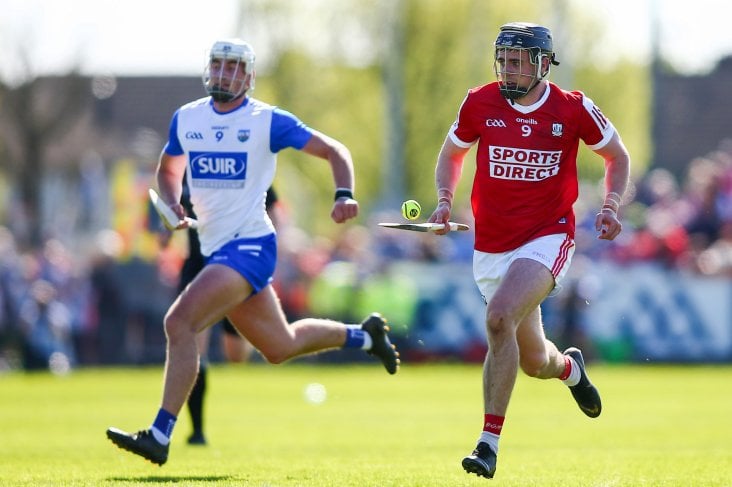Meath greats: Frankie Byrne
November 27, 2010Although Byrne played a significant role in the 1-10 to 1-6 final victory over Cavan in which he converted four frees, he did not see the last 10 minutes of the game! Instead he was in the dressing-room being treated for an injury to his spine sustained in a collision with direct opponent Simon Deignan in the first half.
After receiving an injection during the interval, the wing-forward went back on the pitch to contribute two more points. But after being forced to retire, he had to endure a very nervous closing period and while it was a big relief to hear that Meath were still ahead at the final whistle, Frankie did not get to see the presentation of the cup.
Frankie Byrne played on the Meath team between 1943 and '55, lining out for Leinster a number of times during those years, was part of another golden era for Royal County football when part of Sean Boylan's backroom team, was involved in the launching of national GAA coaching in the '70s and was part of Jimmy Magee's All Stars for 30 years.
Now a sprightly 86-year-old, Frankie recalled his lengthy association with Gaelic games - he also played minor hurling for Meath - which began while attending the old De La Salle school in Navan in his Clontarf home on Dublin's northside.
"I was playing in the under 12 grade at the age of 10 and in the under 14 grade when 12-years-old. We were encouraged a lot to play sports by the brothers in the school. Outside of the sports activities a group of pupils went on Saturday cycling spins to historical places in the county. One of the brothers would lead the tours which were very educational.
"I was the fastest runner in the school and I retained that speed a good number of years later when beating a few inter-county players in a sprint race at a coaching session when in my 50s. Those in attendance thought it was a fluke but I beat them a second time - and a third time!" he said.
Frankie's father, Tommy, who worked in a betting shop in Navan for many years, didn't play football - his famous son said he was too small. The flying forward was noted for his solo runs and on one occasion Tommy was told by a well-known former Meath player and then selector that solo running was ruining football.
Young Byrne played club football with Erin's Hope in Dublin while training to be a school teacher and then with Navan Parnells and was only 19 when first catching the attention of the Meath senior selectors. Although only 5ft 8ins, he made his Leinster SFC debut at centrefield against Louth in Drogheda in 1943. Reports at the time suggested that he was the first player from Navan to be selected since the legendary Tom 'Boiler' McGuinness.
"I was switched to the half-forward line at half-time. Louth won that game and they went on to win out in the province that year. I missed the 1944 championship because of studies but returned to the team for the 1944-45 National League and must have played well as I was selected on the Leinster team for the 1945 Railway Cup.
"Leinster won it out that year, we beat Ulster after a replay before getting the better of Connacht in the final and all the games were at Croke Park. I was at right half -forward and Paddy Meegan was in the right corner. Tony Donnelly and Peter McDermott were in the subs.
"Although I played for Leinster a few more times, a second Railway Cup medal eluded me. I was on the losing side in three finals, in 1946 when Munster beat us, in '47 when Ulster were the winners and in 1950 when Ulster again got the better of us," he recalled.
Frankie Byrne played with four clubs. He gained Meath SFC honours with Parnells in 1946, lined out with Clan na Gael in Dublin for a few years and was on the Navan O'Mahonys team which became the first holders of the Keegan Cup in 1953.
Byrne won his first Leinster medal in 1947 when Laois were defeated in the final. "We had 11 of the All-Ireland winning team of two years later on that team but we were well beaten by Kerry in an All-Ireland semi-final clash.
"That year there was the novelty of the All-Ireland final being played in New York. Kerry were very cute in the game against us with their players going down a lot to disrupt the play. They won by six points but lost the final to Cavan while Meath had to wait another four years to get to America.
"We won the National League in 1946 when defeating Wexford in the final. Wexford had a strong team in those years and we had a few good tussles with them. Also Meath won two Leinster Leagues during the war years when the National League was suspended due to restrictions on travel," he said.
There are no prizes for guessing that the first All-Ireland triumph in 1949 was the highlight of Frankie Byrne's playing career. Even the discomfort and pain as he missed the excitement at the end could not take away from being part of that historic day.
"Fr McManus had done some fine work with the team in the few years before 1949 but Fr Tully came in that year and introduced a few new players which made all the difference.
"After getting over the Kildare and Wexford hurdles, the three games against Louth at the Leinster semi-final stage really hardened us. Louth had a very strong team then, they had won Leinster in 1948," said the wing-forward.
Remarkably immediately the second draw with Louth in 1949 - extra-time was not played - Frankie Byrne changed jerseys to play for Clan na Gael against St Vincent's in the Dublin SFC final which followed the inter-county match at Croke Park.
"During my second game that day I was affected by blisters and had to throw away the football boots and play in my bare feet. We lost the final as St Vincent's won their first senior championship. They went on to dominate Dublin football for a good number of years," he recalled.
"After we eventually got over Louth, the Leinster final against Westmeath was our easiest game of the year. Our All-Ireland semi-final opponents, Mayo, were hot favourites but we thought we could beat them. We played very well in that game to win by six points, that was one of my best games for Meath and Paddy O'Brien was marvellous at full-back," said Frankie about the win over the men from west.
For two weeks before the All-Ireland final against Cavan the Meath players went into a training camp at Gibbstown with county chairman Fr Packie Tully staying with them all the time and other selectors and officials dropping in at night.
"Being together for the couple of weeks was a big advantage as it created better team spirit. Before that we would have trained once a week and then had tea and sandwiches. The training then was nothing like it is these times.
"We weren't looked after nearly as well as the present day players, we didn't get steaks and there were times when I had to get a lift to Dublin from Navan on the late mail van.
"Still we were well treated in Gibbstown. There were no televisions then and I don't remember a radio being there. Still we found ways to amuse ourselves, we trained every day and we did a lot of reading. Sean Giles' wife did the cooking. The last few days were a bit boring as we were mad to play the game.
"Cavan were the preferred opposition and although they were dual All-Ireland champions, we were fairly confident of beating them. Fr Tully celebrated Mass in Gibbstown before we left on Sunday morning and I was the server.
"On the way to Croke Park we stopped at a house along the road near Ashbourne where we had tea and sandwiches. Even though I got the belt after about 15 to 20 minutes, the game went well for us
"We were four points ahead at half-time when I had to get a pain-killing injection. I was okay for a while but with about 10 minutes to go I fell flat on my face and knew then that I couldn't continue. I was in a lot of pain and was very tense wondering what was happening out on the field.
"Paul Russell, one of the selectors who won five All-Ireland medals with Kerry, stayed with me in the dressing-room and it was a great relief that the team held on to the four-point lead," recalled Frankie.
While the rest of the victorious party were celebrating at a reception in Clery's Restaurant in the city centre, Frankie Byrne went to his digs to rest his back. After taking part in the homecoming on Monday night and going to work in the school the following day, he continued to be in some discomfort.
"On the Friday after the final I went to see Dr Dorgan in Navan and he told me that the injury was more serious than was originally thought. I had to get a heavy corset which I had to wear for about a year. But I was back playing the following spring - I was able to play with the back strapped up," he said.
In the two golden eras of Meath football (1947 to '54 and 1986 to '91) Meath could have won more the two All-Ireland titles gained in each period. Frankie Byrne still feels that that one or two more should have won during his own playing years.
"We would have been Mayo in the 1951 final but for the vaccinations before going to New York before the National League final that year. Meath had a very good record against Mayo those years, we beat them in the semi-final in 1949, the home league final in '51 and also in the Owen Ward Cup tournament in London twice, they only beat us once.
"In the 1952 All-Ireland final Meath appeared to have Cavan beaten when a ball in Micheal O'Brien's corner appeared to have gone over the end line before the wind blew it out to Edwin Carolan who kicked the equalising point. Cavan were decisive winners of the replay when Mick Higgins got most of their scores," he recalled.
The 0-6 to 0-3 NFL win over Mayo earned Meath a trip to the Big Apple where they gained a narrow win over a strong New York side at the Polo Grounds just seven days after losing the 1951 All-Ireland decider. "One of my main memories of that game was the small, tight pitch which certainly didn't suit me. With so many games being played on it, there was only grass in the four corners.
"The trip over by plane along with the Galway hurlers took 14 hours - the return journey by ship to Cobh took six days. New York were a very physical team with a number of former inter-county players. It was very hot day and they led by four points in the second half before we battled back and a late goal from Mattie McDonnell was the decisive score," said Frankie.
In 1953 Byrne was in the usual right half-forward position when Navan O'Mahonys defeated Trim to become the first holders of the Keegan Cup. "I liked playing there because of my speed," remarked Frankie who pointed five frees in the 3-7 to 2-4 victory.
He became a county selector that year and had retired from inter-county before being drafted into the squad in Meath's second All-Ireland winning year in 1954. "Tom O'Brien was recovering from a broken collar-bone and if he wasn't able to play in the final against Kerry, I would have been at right half-forward with Micheal Grace going to centrefield. But Tom was okay and Micheal played a star game," said Byrne.
Frankie played some games in the 1954-55 NFL and his last game for Meath was in the 1955 Leinster final against Dublin who romped to a 20-point victory. "I was at right half-back that day, I was selected there to mark Cathal O'Leary but it didn't work out.
"That was a very good Dublin team on the way up and Meath were on the way down, they should have won the All-Ireland that year... That was my last game for county or club and it was also the end of the road for Meath for a few other lads," he said.
Frankie soon quit his role as a selector, saying that he wasn't at much club football in Meath, being domiciled in Dublin. However, he did train the Meath team which won the All-Ireland minor title for the first time in 1957 and also held the position of Leinster Council delegate for four years in the '50s.
In the 1970s when the GAA began to put more emphasis on coaching, Byrne became part of the coaching squad with other notables like Jim McKeever (Derry), Joe Lennon (Down) and Dr Mick Loftus (Mayo).
Frankie and his wife Rita had six children. Sadly the first of them died at childbirth on St Patrick's Day, 1955 and was named Patrick. The other three sons, Paul, Frankie junior and Mark, were all involved in sport and their daughters are Deirdre and Ursula.
Paul was born on the night of the 1957 All-Ireland football finals and after playing some Gaelic football during his early years, he concentrated on a soccer career, playing in goals for the Republic of Ireland at schoolboys and youth levels and minding the nets for Home Farm in the League of Ireland. Frankie junior and Mark both played Gaelic football with the Clontarf club.
Frankie senior became part of Sean Boylan's backroom team in the '80 and '90s. He went on to the Croke Park pitch to congratulate the man from Dunboyne after the Centenary Cup victory in 1984. The manager invited the former county forward into the dressing-room to meet the players who gave him a friendly welcome.
"A few months later I went to Sean about some ailment or other and told him that I would like to go to some training sessions. He said he would be delighted if I went along and I hardly missed a session from 1985 on.
"I coached close-in free-taking, oversaw drills and exercises while Sean was otherwise engaged, refereed games, gave advice when asked for it and was made part of the backroom team. I enjoyed every minute of it.
"Sean, like his father and grandfather before him, has spent all his adult life caring for people with various ailments and was always generous with his time. Sometimes after training, a spectator would approach him and ask him to look at an injured knee, ankle or whatever and he would never refuse. Sean once told me that he would never refuse such a request, saying that an ounce of help is worth a ton of sympathy.
"This caring and compassionate attitude was also manifest in the way he treated players and he made sure to get to know each of them personally. If any of them had a problem which militated against their performing well as players, he did his best to cure or alleviate the problem. In this way he established an empathy with players which, in my experience, was unprecedented.
"Liam Creavin (Frankie's brother-in-law) always referred to Sean Boylan's era as coach as 'the golden age of Meath football' and how right he was. Sean has more connections than a telegraph exchange. He would use any legitimate means at his disposal to improve his players as individuals and as a team.
"He was the first coach in Meath to ensure that his players got a three-course meal after training sessions, he brought the team to Scotland and other places for weekend breaks so that the hard grind of training sessions wouldn't get too monotonous and to aid the 'bonding' process,
"I had the unofficial title as an advisor. I was asked to become a selector but didn't accept because of being out of touch with club football in Meath. However, my opinion was sometimes sought and I was happy to give it. My son, Paul, became the goalkeepers' coach and, like myself, he has many happy memories of the evenings in Dalgan Park.
"Like in my own playing days, Meath could have won one or two more All-Ireland in 1990-'91. I feel that Gerry McEntee not being allowed to play football while he was based in America was unfair and affected the team," Frankie said.
Over the decades Frankie Byrne took part in numerous sports. Apart from Gaelic football, he played a little bit of hurling and also during his younger years he tried his hand at basketball, table tennis, swimming, snooker and billiards. He has had a long
association with golf and became an honorary life president at Royal Dublin.
Another string to Frankie's long sporting bow was playing with Jimmy Magee's All Stars with whom he lined out for 30 years. "I was involved in a radio programme called Junior Sports Magazine in the late'50s and early '60s when I was doing pieces on Gaelic football. Jimmy Magee was one of the reporters and he told me about a team he was starting made up of past players and showbiz personalities.
"The games were played on Monday nights all around the country with a dance being held in the town afterwards. The first game took place in Ballyjamesduff, Co Cavan in June, 1966 and over a 30-year period around £6 million was raised for different charities.
"As well as playing in every county in Ireland, we played in London, Birmingham, Boston, New York and Las Vegas. The games always ended in a draw and I played my last game with them in Las Vegas at the age of 73!" he said.
Frankie Byrne has some strong views on Gaelic football as it's played these days. "I feel the game has gone lacklustre. I watch most of my matches on television these days and the game which I enjoyed most this year was the All-Ireland women's final in which there was some fine high catching and good foot-passing,
"I don't enjoy most of the matches these days. There is too much emphasis on physical fitness and with so much concentration on defensive play, Gaelic football has gone down as a spectacle.
"Still the Down approach this year was refreshing, they just fell short because they had not enough tall players. There was more high catching in this year's All-Ireland final than for donkeys years and I enjoyed it.
"There is one change which I would like to see introduced into Gaelic football and that is the reduction of the number of players on teams to 13. That would give more space to players with speed," he said.
Frankie loves to keep in touch with players of the past. "Every September for the past number of years the members of the 1987-88 team meet for a golf outing and dinner to which the wives are invited and I have been invited to every outing.
"At 86 years of age I can still just about swing a golf club but I've thoroughly enjoyed renewing old acquaintances and reminiscing about past games. I feel privileged to have known these lads," he said.
Anyone who has known Frankie over the decades of his involvement with the GAA can feel equally privileged. Tweet
